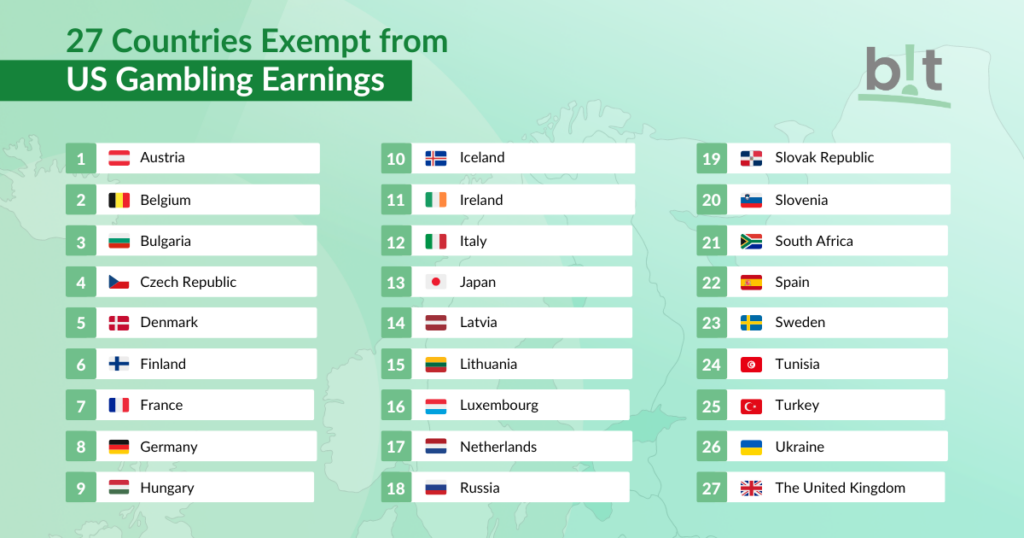Winning the lottery is thrilling — but in the midst of the excitement, you can’t forget about taxes on lottery winnings. Understanding the tax implications of winning the lottery is the key to minimizing your tax burden and maximizing your take-home gains. This is especially important for US expats and nonresident aliens, who may be subject to taxes in more than one country.
What’s more, you’ll need to keep reporting obligations in mind. All US expats and nonresident aliens who meet the minimum income reporting threshold must file a US income tax return. And because the US requires tax residents to report their worldwide income, even expatriate US expats with foreign lottery winnings must disclose it on their tax return.
But what counts as lottery winnings, how much are they taxed, are there any lottery win exclusions, and how does winning the lottery abroad affect your taxes? We’ll dig into all this and more below.
What does the IRS consider lottery winnings?
The IRS considers lottery winnings to be gambling income — a category which also includes earnings from raffles, horse races, and casinos.1 Although gambling income is unearned, the IRS typically taxes it as ordinary income.
How much tax does the IRS take from lottery winnings?
Lottery winnings of $600 or more (or 300 times the amount of the wager) are subject to US taxes and reporting.2 As we mentioned above, lottery winnings are subject to ordinary income taxes.
The precise rate your lottery winnings are subject to depends on your tax bracket and, by extension, your overall taxable income.
| Tax Rate | Single or Married filing separately | Married filing jointly | Head of household |
| 10% | $0 – $11,600 | $0 – $23,200 | $0 – $16,550 |
| 12% | $11,600 – $47,150 | $23,200 – $94,300 | $16,550 – $63,100 |
| 22% | $47,150 – $100,525 | $94,300 – $201,050 | $63,100 – $100,500 |
| 24% | $100,525 – $191,950 | $201,050 – $383,900 | $100,500 – $191,950 |
| 32% | $191,950 – $243,725 | $383,900 – $487,450 | $191,950 – $243,700 |
| 35% | $243,725 – $609,350 | $487,450 – $731,200 | $243,700 – $609,350 |
| 37% | $609,350+ | $731,200+ | $609,350+ |
Source: Nerdwallet
As you can see, winnings may be subject to up to a 37% tax rate at the top bracket. While this tax rate may seem daunting, there are strategies you can implement to mitigate the tax burden on your lottery winnings, which we’ll cover further below.
Withholding taxes on US lottery winnings
If your lottery winnings are US-sourced and exceed $5,000, the IRS will automatically withhold 24% of your net earnings (your total earnings minus the cost of your lottery ticket).
Note:
Those who qualify as state tax residents may also be subject to state withholding taxes (more on that in a bit).
Note that this withholding tax is not in addition to ordinary income taxes — think of it instead as an upfront payment on your taxes. If you ultimately fall into a lower tax bracket than 24%, you can request a refund on the excess amount taxed from the IRS.
State-specific tax information for lottery winnings
Some expats continue to qualify as state residents for tax purposes even when they live abroad. This can happen to those who have strong ties to a certain state (e.g. a permanent home, income sourced from that state) or who most recently lived in one of the “sticky states”:
- California
- New Mexico
- New York
- South Carolina
- Virginia
Lottery winners who meet the criteria above will likely be subject to state taxes. However, the tax on lottery winnings by state varies.
States with higher tax rates on lottery winnings
Most states tax lottery winnings as ordinary income. As a result, those with higher state income taxes tend to impose higher tax rates on lottery winnings. That being said, several have special rules for taxing lottery winnings.
Taking all of that into account, the states that levy the highest tax rates on lottery winnings include:3
- New York: 10.9%4
- Note: Certain cities impose additional taxes, including New York City (3.876%) and Yonkers (1.82575%)4
- Maryland: 8.75%
- Oregon: 8%
- New Jersey: 8%
- Wisconsin: 7.65%
And while not a state, Washington DC imposes an 8.5% tax on lottery winnings.
States with no state income taxes
Several states have no income taxes at all. As a result, they don’t impose taxes on lottery winnings, either. This includes:5
- Alaska
- Note: Does not have a state lottery
- Florida
- Nevada
- Note: Does not have a state lottery
- New Hampshire
- South Dakota
- Tennessee
- Texas
- Washington
- Wyoming
States with specific exemptions for lottery winnings
While California and Delaware have state income taxes, they specifically exempt lottery winnings from taxation.
Are foreign lottery winnings taxable by the US?
As we mentioned earlier, all American citizens and permanent residents whose income exceeds a certain threshold — even those who live abroad — must file a US income tax return. On it, they must report all income they have received, regardless of where in the world it came from. Naturally, this extends to foreign lottery winnings.
All gambling winnings, including foreign lottery prizes, are subject to the same ordinary income tax rates that we discussed earlier. As such, the exact tax rate on these winnings depends on how much you’ve won and which tax bracket you fall into.
One important difference, though, is that the IRS will not automatically withhold 24% on foreign lottery winnings like they do on US lottery winnings. This makes it important to plan for taxes ahead of time so you don’t receive an unpleasant surprise when the tax deadline rolls around.
Do foreigners pay taxes on US lottery winnings?
Just like US citizens and permanent residents, nonresident aliens are subject to taxation on US lottery winnings. As a rule, the lottery organization, federal government, and state will all directly withhold taxes on non-resident lottery winnings.
Nonresident aliens are generally subject to a flat federal withholding tax of 30% on lottery winnings, regardless of the amount.6 That said, nationals of countries with an active US income tax treaty may be able to claim reduced withholding rates.
Tax treaties & reduced withholding rates

Tax treaties are agreements between two countries designed to help nationals of one country living in the other avoid double taxation. While a tricky clause precludes most US citizens and permanent residents from the majority of treaty benefits, tax treaties can be very beneficial for nonresident aliens.
In particular, many of these treaties reduce withholding rates — including the ones levied on lottery winnings. Nationals of any of the countries listed above can present Form W8-BEN to the withholding agent or payer to claim their US tax exemption and treaty benefits.
Note:
You do not need to file Form W8-BEN along with your US tax return.
Strategies to minimize taxes on lottery winnings
If the idea of steep taxes on lottery winnings makes you nervous, don’t worry — there are ways to mitigate your tax burden. A few of the most common ones include:
Distributions vs. lump-sum payouts
One common lottery win tax strategy is to elect for your winnings to be paid out in distributions or annuities over an extended period of time rather than a one-time, lump-sum payment.
This is especially important when you’ve won a substantial amount of money that could significantly increase your tax liability. Large lump-sum payouts lead to a higher taxable income which can bump you up a tax bracket — or even several, depending on the amount.
Deducting US-based gambling losses
Amateur gamblers who forego the standard deduction can choose to itemize their gambling losses on Schedule A. There are a few caveats, however:
- You can only deduct gambling losses from gambling winnings — not other types of income
- Gambling loss deductions cannot exceed gambling winnings
- Example: If you won $100 from gambling one time but lost $300 another time, you can only deduct the first $100 of losses
- You must keep detailed records to back up your gambling winnings and losses in the event of an audit
Professional gamblers, on the other hand, will report gambling losses (and winnings) on Schedule C: Profit or Loss from Business.
The Foreign Tax Credit (FTC)
If your lottery winnings are foreign-sourced — or if they’re US-sourced but you’re a tax resident of another country — they will likely be subject to foreign taxes. While this can potentially result in you owing taxes on the same income to two different countries, a handy expat tax break called the Foreign Tax Credit (FTC) can help you reduce — or even eliminate — this risk.
The FTC gives Americans dollar-for-dollar US tax credits on any foreign income taxes they’ve paid that are legal and charged to their name. The FTC can be particularly beneficial if the foreign tax rates on your lottery winnings are higher than the US tax rates. In this situation, the FTC typically not only eliminates your US tax liability, but also gives you carryforward credits to use in the future.
B!T tip:
The other major US expat tax break is the Foreign Earned Income Exclusion (FEIE). The FEIE allows expats to exclude up to $126,500 (for tax year 2024) of foreign-earned income from US income taxes. However, the FEIE only applies to earned income, such as salary wages and commissions — not unearned income like gambling winnings.
How to reduce taxable income
Expats with a sudden influx of gambling income can help offset it — at least partially — by exploring other ways to reduce their overall taxable income. A few ways to do this might include:
- Maxing out your tax-advantaged retirement accounts
- Donating to qualified charitable organizations
- Gifting property to loved ones
- Taking advantage of additional tax credits, deductions, & exclusions
Of course, this is far from a comprehensive list. The right tax strategy for you will depend on your unique circumstances. Before taking advantage of any given strategy, however, make sure to consult a tax professional to ensure it suits your situation.
How to report lottery winnings on federal taxes
When you win a qualified US lottery, you will receive Form W-2G: Certain Gambling Winnings. If you win the lottery in a foreign country, they may issue you a similar form summarizing your earnings. You’ll report the information found within these forms on various components of your tax return.
What forms to file for your lottery winnings
Some of the forms and schedules you may use to report your lottery winnings include:
- Form 1040: The primary tax return form for most US citizens & permanent residents
- Form 1040-NR: The primary tax return form for nonresident aliens
- Schedule A: For amateur gamblers to deduct gambling losses
- Form W-8BEN: For nonresident aliens to claim reduced withholding tax rates on lottery winnings under a tax treaty
- Note: Nonresident aliens must submit this form to the lottery winnings payer, not the IRS
- Schedule C: For professional gamblers to deduct gambling losses & earnings
Foreign lottery winnings may also trigger FBAR filing
The Foreign Bank Account Report (FBAR) is mandatory for any American whose combined foreign account holdings exceed $10,000 at any point during the tax year. As such, expats who deposit lottery winnings into a foreign financial account — like a checking account, savings account, brokerage account, retirement account, etc. — may need to file an FBAR.
Minimize your tax bill the easy way
Whether you’ve won the lottery or not, everyone wants to reduce their tax bill as much as possible. Unfortunately, complex tax laws and codes make it difficult to develop an optimized tax strategy without specialized knowledge and hours upon hours of effort. Add international tax implications into the mix, and it gets all the more confusing. That’s where Bright!Tax comes in.
As a dedicated tax firm for US expats and nonresident aliens, we’re experts in US tax law and foreign tax implications. Partner with us, and we’ll match you with a CPA who’s uniquely qualified to help you craft a winning tax strategy, minimize your tax liability, and file an accurate and fully compliant tax return.
Schedule your free 20-minute consultation today!
References

 Connect on LinkedIn
Connect on LinkedIn







